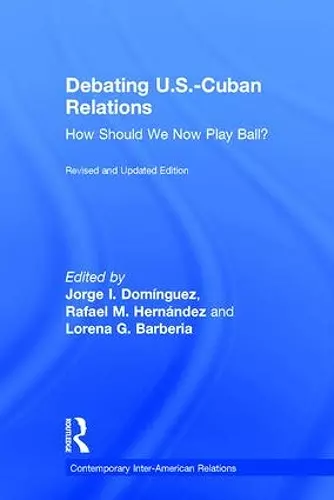Debating U.S.-Cuban Relations
How Should We Now Play Ball?
Jorge I Domínguez editor Rafael M Hernández editor Lorena G Barberia editor
Format:Hardback
Publisher:Taylor & Francis Ltd
Published:24th Jan '17
Currently unavailable, and unfortunately no date known when it will be back
This hardback is available in another edition too:
- Paperback£46.99(9781138281240)

The boundary between Cuba and the United States has become more and more porous, as have those with Latin America and the Caribbean. Never in the past half-century has Cuba’s leadership or its social and political fabric been so exposed to the influence of the outside world. In this book, an all-star cast of experts critically address the recent past and present in U.S.-Cuban relations in their full complexity and subtlety to develop a perspective on the evolution of the conflict and an inventory of forms of cooperation. This much needed approach provides a way to answer the questions "what has been . . .?" and "what is . . .?" while also thinking seriously about "what if . . .?"
To illustrate the most significant areas of U.S.-Cuban relations in the contemporary era, this newly updated edition of Debating U.S.-Cuban Relations adds six more themes to the study of this complex relation: political, security, economic, and cultural/academic issues; the triangular relations of the United States, Cuba, and Europe; and the politics of Cuban migration/emigration. Each topic is represented by perspectives from both Cuban and non-Cuban scholars, leading to a resource rich in insight and a model of transnational dialogue.
The future course of U.S.-Cuban relations will likely be more complex than in the past, not only because of the matrix of factors involved but also because of the number of actors. Such a multiplicity of domestic, regional, and global factors is unique; it includes the rise to power of new administrations in both countries since 2008. Raúl Castro became president of Cuba in February 2008 and Barack Obama was inaugurated president of the United States in January 2009. And it will feature the inauguration of a new president of the United States in January 2017 and a new president of Cuba, likely in February 2018.
'For the third time, Dominguez, Hernandez, and Barberia have reassembled their all-star team of Cuban and U.S. scholars to reflect on the dynamics of bilateral relations leading up to and following the December 17, 2014 decision to normalize U.S.-Cuban relations.' - William Leogrande, American University, USA
'The editors have assembled a five-star cast of analysts, both Cuban and non-Cuban, to explore and update the long-term dynamics of U.S./Cuban relations. Given the recent improvement in those relations, these analyses can be seen as a significant resource in both policy-making and the larger public arenas.' - H. Michael Erisman, Indiana State University, USA
'Wise old Solomon got it wrong. There is something new under the sun, and it's called U.S.-Cuban relations in the 21st century. The first edition of this classic book appeared in the midst of bitter Cold War and the real threat of armed conflict between Cuba and the U.S. Full Stop. Fast forward to 2017. Surreally, Cuba and the U.S. have normalized relations. The American and Cuban presidents have gone to a baseball game together in Havana and eaten popcorn from the same box. It's a whole new ball game! The editors and authors of this new edition are our very best guides as to how the game should be played under the new circumstances.' -James G. Blight, Balsille School of International Affairs, Canada
'The updated edition of Debating U.S.-Cuban Relations comes at a propitious moment for students and policy makers to appreciate the complexity of normalization between the United States and Cuba since they re-established diplomatic relations. As with the excellent first edition, this volume enables readers in both countries to engage key issues empathetically, because the authors are among the most knowledgeable in each country. The book provides both cogent broad analyses and useful current information about both countries’ policies and interests.' - Philip Brenner, American University
"For the third time, Dominguez, Hernandez, and Barberia have reassembled their all-star team of Cuban and U.S. scholars to reflect on the dynamics of bilateral relations leading up to and following the December 17, 2014 decision to normalize U.S.-Cuban relations." - William Leogrande, American University, USA
"The editors have assembled a five-star cast of analysts, both Cuban and non-Cuban, to explore and update the long-term dynamics of U.S./Cuban relations. Given the recent improvement in those relations, these analyses can be seen as a significant resource in both policy-making and the larger public arenas." - H. Michael Erisman, Indiana State University, USA
"Wise old Solomon got it wrong. There is something new under the sun, and it's called U.S.-Cuban relations in the 21st century. The first edition of this classic book appeared in the midst of bitter Cold War and the real threat of armed conflict between Cuba and the U.S. Full Stop. Fast forward to 2017. Surreally, Cuba and the U.S. have normalized relations. The American and Cuban presidents have gone to a baseball game together in Havana and eaten popcorn from the same box. It's a whole new ball game! The editors and authors of this new edition are our very best guides as to how the game should be played under the new circumstances." -James G. Blight, Balsille School of International Affairs, Canada
"The updated edition of Debating U.S.-Cuban Relations comes at a propitious moment for students and policy makers to appreciate the complexity of normalization between the United States and Cuba since they re-established diplomatic relations. As with the excellent first edition, this volume enables readers in both countries to engage key issues empathetically, because the authors are among the most knowledgeable in each country. The book provides both cogent broad analyses and useful current information about both countries’ policies and interests." - Philip Brenner, American University, USA
ISBN: 9781138281233
Dimensions: unknown
Weight: 566g
326 pages
2nd edition